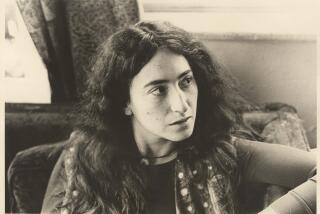The Voice Lingers
- Share via
Writer, actor, philosopher and radio host Harry Shearer of KCRW-FM (89.9) met the late radio legend Jean Shepherd just once. It was during the watershed summer of 1963, when Martin Luther King Jr. led 250,000 in the March on Washington for civil rights. Shearer was the editor of UCLA’s humor magazine, Satyr, and he spent several hours one night interviewing Shepherd.
Shearer had discovered Shepherd’s “dispatches from the hipper part of the world” in Mad magazine, but it was during summer internships in New York in ’62 and ’63 that he became a fan. Shearer was so drawn to the languid storytelling style that he began taping Shepherd’s weeknight shows on New York’s WOR--10 of which he still has.
“When Jean passed on [Oct.16 at age 78], the obituaries paid a lot of attention to his television and movie work, and gave short shrift to his radio work,” Shearer said. “I, like a lot of his fans, thought that the stuff he did on the radio was possibly the best work that he ever did. And I just wanted to draw attention to that.”
So was born “A Voice in the Night: A Tribute to Jean Shepherd,” hosted and produced by Shearer. In concert with National Public Radio’s decision to distribute the two-hour tribute to public radio stations around the country, KCRW, which first broadcast it Christmas Eve, will replay the show Sunday night from 7 to 9 p.m.
Today, Shearer, longtime host of the satirical “Le Show,” heard Sunday mornings from 10 to 11, struggles to recall a tallish, rather ruddy-faced man with thinning hair. But he never forgot the voice of the transplanted Indianan with its built-in, bullet-fast sound effects, nor the multifaceted, 45-minute monologues--replete with wit, intelligence and word pictures--which, meandering though they were, always had a point.
Original Shows Part of Tribute
In constructing the tribute, Shearer began with his own tapes, including Shepherd’s account of what it was like riding on a cross-town bus to Washington to participate in the King rally. Meanwhile, co-producer Art Silverman, a producer for NPR’s “All Things Considered,” was able to add several dozen more to the stash, acquiring some of them through Internet inquiries. Silverman also conducted the interviews about Shepherd that are laced throughout the show.
Although “Voice in the Night” is interspersed with those reminiscences--from such as Paul Krassner, editor of the Realist; Kenneth Turan, movie critic of the Los Angeles Times; and cartoonist Jules Feiffer--Shearer determined early on that the bulk of “Voice”--at least 80%--would be Shepherd talking.
“The best person to explain what he did and how well he did it was Jean,” said Shearer, who, after Shepherd’s death, spent the month of November driving around Los Angeles listening to classic Shepherd tales. “Going back and listening to him, it’s amazing how undated he sounds.”
Shepherd, for whom life was grist for his monologues, grew up in the industrial town of Hammond, Ind., worked in a steel mill, attended Indiana University and served during World War II in the U.S. Army Signal Corps. His account of his unit’s decision to stonewall when it was reassigned to learn Morse code basics at “code school”--all of the members already masters of the system, which the bureaucrats failed to notice--is stunning. It didn’t matter that most of his audience would never see the inside of the military, his description of the dot-dash code being taught and of the groups’ “inability” to get it was a universal one of individual frustration in the face of an immovable hierarchy.
‘I’m Not Going to Take It Anymore’
It was Shepherd who urged listeners to crank up their radios and hurl epithets along with him from their opened apartment-house windows. They did. Shepherd is often credited as inspiring the classic scene in “Network” (1976) when TV newscaster Howard Beale gets New Yorkers to fling open their windows and join his manic chant: “I’m mad as hell and I’m not going to take it anymore.”
Shepherd worked nights for WOR from 1956 to 1977, when, as Larry Josephson, independent public radio producer, says on “Voice,” Shepherd was either “dropped or fired . . . and he never got over it. . . . He would insist to one and all that he was not really a radio person” but rather a novelist, a screenwriter. That work included “A Christmas Story,” the quirky 1983 Christmas movie classic that Shepherd wrote and narrated, and the PBS specials “Jean Shepherd’s America” (1971) and “Shepherd’s Pie” (1985).
Of course, that was not the view of his fans.
“When I started listening to him on the radio, it was mesmerizing,” Shearer said. “It was basically a form of radio that no one ever did before or since--extemporaneous monologues that had the quality of written memoirs or essays. Yet it was the very opposite of hearing a writer read his work.
“Shepherd was a master of the medium of radio,” continued Shearer. “He understood it, he knew how to use it, he didn’t think he was slumming. He understood how to get effects, vocally and with music and with pauses, and he also understood the power of talking, one to one, to his audience at night, about things that were part of their lives as well as his. He did not pander to his audience. He knew that his audience was mainly the kids that thought they were hip, and he loved tweaking them about how much they thought they knew.”
Beyond technique was content. “It was like news from a part of the country I really didn’t understand,” Shearer said. “His stories about growing up in Indiana were like the best reporting I’d ever heard on the subject, and filled in the blanks that those of us in New York and Los Angeles [didn’t] often think about.”
A Precursor to Today’s Monologuists
While allowing for Shepherd’s uniqueness, Shearer sees some stylistic ripples in modern-day radio--particularly Joe Frank, host of KCRW’s “The Other Side,” whose show, following Shearer’s on Sundays, airs from 11 a.m. to noon, and in Garrison Keillor (“A Prairie Home Companion”). “They’re both monologuists. Garrison veers now more toward nostalgia, but in the early days, he was mining some of the same topics--being gently satirical and very knowledgeable about Midwestern small-town life. And Joe sort of represents the hipper end of Shepherd’s work, the slier, more surreal stuff that [Shepherd] would do from time to time.”
For Shearer, more important than the legacy is how much of what Shepherd said more than three and four decades ago still resonates. “His is a much more contemporary view of the country. He saw the blending of everything into show business. I remember hearing him in 1963, apropos of Kennedy, saying pretty soon just everything is going to be show business. Politics and literature, it’s all going to turn into show business. Back then, it was goofy and amusing. Now it’s prescient.”
*
* “A Voice in the Night: A Tribute to Jean Shepherd” airs Sunday from 7 to 9 p.m. on KCRW-FM (89.9).
More to Read
The biggest entertainment stories
Get our big stories about Hollywood, film, television, music, arts, culture and more right in your inbox as soon as they publish.
You may occasionally receive promotional content from the Los Angeles Times.










